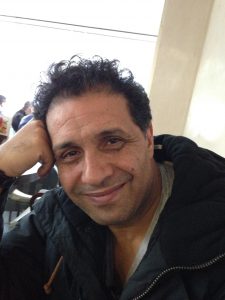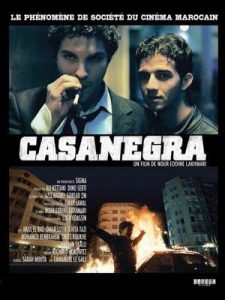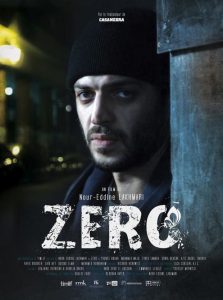Casablanca, 15 February 2016
Nour-Eddine Lakhmari is a charming, warm, busy man: since his first feature film Le Regard (2005), he has shot two hits, Casanegra (2009) and Zero (2012) and has just finished shooting the third film of his trilogy: Burnout. Casanegra earned him three festival awards and a nomination in 2009 (Best Direction at Brussels; Special Jury Award for Best Arab Film at Damascus; Best Director at Taormina; and a nomination for a Muhr at Dubai) while Zero won five awards at the Tangier National Film Festival and the jury prize at Tetouan. Both films fared very well at the box office in Morocco.
I was immensely grateful to him for agreeing to see me, since he was starting to shoot Burnout the day after our interview in February. We met at the Louvres café, a skip and a jump away from the Twin Towers, downtown Casablanca, in the neighborhood where he was setting up his shoot. He rushed in, a large smile illuminating his entire face, sat down and immediately started to talk…
Q: Who produces your movies?
A: Well, different producers. Casanegra and Zero were produced by Moroccan, Norwegian, Italian and French production companies. But in the case of Burnout I am producing the film that I am starting to shoot tomorrow, myself. I created my own company. It’s called Nel Films. And I have secured a couple of co-producers: Icflix, which is like Netflix but is in Dubai, a Norwegian company called Filmhuset AS, and an Italian company called Augustus Color.

So, I write, I get the money from the state [the CCM], which I find funny, because even though they say that what I do is hard and dark, they still support me…. Then I get the other funds, and make the movie.
Q: How are they received?
A: It’s actually interesting that people who went to see my films say that they are anti-Moroccan. I don‘t think they are anti-Moroccan! I think they are human stories. My films are all about one topic to which I always return: redemption. I think Moroccans should start to work on themselves: they have to like themselves, love themselves, and learn to accept that there is a lot of work to do on themselves. While the conservatives in Morocco have criticized me a lot, the funny thing is, one day the King called me and gave me a medal of honor. It was right after Zero. The Islamists all started to ask: what kind of a movie is this? And they started to say it was a Zionist film, an anti-Moroccan film, that’s when the King called me and gave me medal… And I just thought: OK, I have to go on! And I am going on.
Q: Zionist? Really?
A: Look, whenever we have a problem, we blame it on the outside instead of asking: well, what’s wrong with us? The conservatives do not want to see that whatever problem we have, it is a Moroccan one. Whenever they see something in your film that has to do with love, they reject it as a Zionist image or, in my case, a Norwegian one. So a nude body makes you a Zionist?
The problem is that they don’t want to see themselves in the mirror. That’s why, in my opinion, throughout the Arab world, actually, we have a complex about who we are, an identity crisis. Today we, Moroccans, with all the reforms afoot and with what is going on in the world, we are saying loudly: we are Jewish, we are Muslim, we are Berber, we are African, we are Spanish, we are Portuguese. This entire mix is what Morocco is today. We have to face it, celebrate it. But, remember, Islamists hate the arts, hate culture, because they know that arts and culture are what is going to free the people from prejudice. Actually not only arts and culture: education as well.
Q: Do you think that if Zéro had come out when the Islamists were in power, it would have faced the same problems Ayouch’s film did? Because, clearly, Ayouch is not the first one to say and show female prostitution on screen…
A: Well, we have seen this before. It started with Leila Marrakchi’s film Marock. When it came out, everybody was asking: “what is this?” And we fought these people. Then came Casanegra. Then came Zero, then came God’s Horses, then came Much Loved. I think they are doing their job, which is trying to stop us. And we are doing our job, which is to create. America had it much worse with McCarthyism. But today, in Morocco, it’s difficult for the Islamists to do what McCarthy did because we have Facebook and the world is watching, and we have a King who loves cinema. So there is a power in place counterbalancing theirs. They still have a lot power, however, and will try everything they can to stop us.

What happened with Much Loved was really sad: I was probably the only director to fight for it, and that hurts. Yes, I was furious at my colleagues. I saw one producer, and also a woman artist, a painter, but I saw no film director go to the press and fight for the film as this producer and I did. This is significant because the most important voices in the industry went silent. Now we are seeing that Much Loved is winning: we are going to show it here some day! They can try and stop us as much as they want, it is going to be shown one day – because it’s here to stay forever. And they are not going to stay forever. History is on the side of the people who dare, and history is on the side of the people who love cinema and the arts. I think that the difference between Much Loved and Zero, Casanegra and Ali Zawa, that Nabil also did, is that we were in fiction and fiction tackles topics sideways. What shocks the Moroccans with Much Loved is that is it frontal. Nabil wanted a documentary/cinéma vérité approach. It’s a little like John Cassavetes and all the Swedes in the 1940s and 1950s. So, that was more shocking. That’s why the Islamists who are now in power censored the film. But in my humble opinion, the Islamist Minister of Communication [who denied the release visa in the Kingdom, thus barring the film from being shown on Moroccan screens] did something hors la loi: the film had not gone to the CCM yet to ask for the authorization to be released. Only after that would he have been able to stop it. But it was not his place to stop it. It’s the purview of the Commission de Contrôle. But he was scared, took his phone and stopped the film in its tracks. We went out and called him McCarthy because the film was no big deal. I saw it in Cannes. I don’t think Nabil said things we did not know. He just said: here we are! And in this entire commotion, we lost the crucial social debate we could have had: instead, the debate left Morocco to go to France, which is sad for us.
And yet, it is high time for us to have a debate about us, about our society, about prostitution, about homosexuality… The Minister of Communication could have said: “Hey, calm down! Let’s all see the film and have a debate.” In Sweden and Denmark, someone in his position would have asked for a PG-18 rating to see the film. It’s simple: just put the rating system in place and have a good debate on TV, the audience will follow. But letting the public say anything they want on Facebook and confirming their hatred by stopping the film release… This Minister and these people are hurting Morocco more than the film. Now all you hear is that Morocco has “censored” a film, you hear nothing about prostitution and its causes. Why? because our Minister is an Islamist. But this does not mean that history will stop here. Nabil will go on making films, I will go on making films, Narjiss [Nejjar], Leïla [Marrakchi] will go on making films. And when we die, somebody else will do it, because history repeats itself. In Sweden, in the 1950s, when Bergman made The Seventh Seal in which he criticized God, everybody said it was an antichrist film. Now, everybody says Bergman is the best director ever. What Europe experienced then, we are experiencing now. The advantage we have is that we have Facebook and the Internet that move things forward faster.
Q: You made Casanegra, Zero, and now Burnout. Any tidbit you might give me about Burnout?
A: I think my biggest problem living in this society for the last six-seven years now, in Casablanca, is the enormous difference between the rich and the poor. There is a wall between them: on one side of the wall, the rich are saying, with utter contempt: the poor are stupid. And on the other, the poor are saying: the rich are fat, they are thieves and they hate us. So everybody on each side hates the people on the other and nurtures all sorts of prejudices about the others… The film shows that in the end, there is only one thing that can save us all: love. But we cannot have love unless we love ourselves.

This is a very serious problem we have. I’ve said it on TV, on the radio: it is time Moroccans started to love themselves. I am not talking about narcissism. Love and narcissism are two different things. We have been following what is going on in France, for instance, and we have no idea about what is going on here. It is time to open up to other cultures: to look at England, to look at Scandinavia, at America, at Asia. Most of the time, we look at Egypt, Dubaï, and Paris. And that is not the world. I mean, I love Paris to death, but we have seen that France has problems too, so we have to look at Copenhagen, Stockholm, Seoul, and learn and understand. The Moroccans have to open up a little to more diverse horizons.
One precious thing we have in our country is our youth. It is a very young country, and a multicultural, multiethnic one. The day we finally separate power from religion, we’ll be moving on.
Q: It seems that your theme of redemption could go on forever. If this is the third part of a trilogy, how are you going to find a conclusion to it?
A: I’m not going to stop there… I called it a trilogy because the subject is redemption. The people who do not like my work sometimes accuse me of having stolen it from the Christians, that it is a Christian subject! That’s stupid: redemption applies to all humans. I don ‘t care if you are a Jew, a Muslim, an atheist…
After this film, I plan to go and film in Tangier because I love Tangier; then, I am going to film in Rabat; I am going to film in Marrakesh; I am going to film all these cities and then I am going to come back to Casablanca because Casablanca is beautiful: it is our New York. You can film thousands of films here and still say: I have yet to tell the story of Casablanca. Casablanca is Morocco: it’s a micro-Morocco!
Q: In your two films, Casanegra and Zero, there is a very sick father…
A: Always… Good point! We are in a patriarchal society where the father is God, where the father is sacred. The father is sick in this country and I am using this metaphor to show that the guy does not know everything, he is not God, and he is not the one who should always make all the decisions.
I love my father, but he is not God and he is not the one who decides. I am not an individualist, but if we, Moroccans, want to move on, we need to lead our own private lives. There are thousands of couples still living with the father – the mother, at times – and it is killing them because the father rules in every single domain. And, I am sorry, many fathers are wrong. What I show in my films is that Moroccans can say: well, I can live my life without my father interfering in it. I see the power of the father as a sickness that metaphorically becomes a physical sickness in my films. But then, when the movies came out, people said: “Oh! Nour-Eddine has a problem with his father.” I don’t! I love my father! He has been supportive of me but he has not interfered in my life. In my films, the father figure has nothing to do with my father: it is the figure of power – the teacher, the police officer, the one who has money…
And why do men have so much power in this country? Religion gives it to them, the constitution gives it to them, the law gives it to them and their mothers give it to them! That’s why men in this country think they can say and do whatever they want. And it is time to stop. So all I am saying is that we are sick – we are alcoholic, we have psychological problems – because this power makes us sick and we are sick of this power. Take a hard look at the constitution: there is so much that men get away with, and I totally disagree with that. For instance, if a man divorces a woman, she cannot do anything with the children unless she asks for permission from her ex-husband. This is totally unacceptable…
Today, in Morocco, the only people who are pushing society forward are film directors. We don’t have authors pushing the limits – if there is one, I have not seen any of his or her books creating a big discussion in our society – nor do we have painters, plastic artists doing it, but directors, yes. We had Nabil’s Ali Zawa that started something, Marock that created a huge tsunami; then we have Casanegra, then God’s Horses, then Amours Voilées, then Zero, and now Much Loved. But I wish we could make three Casanegras a year, three Marocks, because we need to wake up Moroccan society.
Q: In your new film, will there be any substantial female characters?
A: This is the end of the trilogy. But now, the main characters are women. And they are all strong. In Casanegra and Zero, I showed how I see men, and now I am showing how I see women. I have three wonderful characters: I have a callgirl, a woman who does not have feet but who is strong and creates a huge, wonderful emotional energy in the story with her son, and a gallery manager fighting to have a painting of Saladin. Those three characters correspond absolutely to my image of Moroccan women. I think this society is moving forward thanks to women.
Q: When do you think will you be done with your film?
A: From tomorrow on, it will be nine weeks of shooting. After that, it should be ready by the end of the year.
Florence Martin